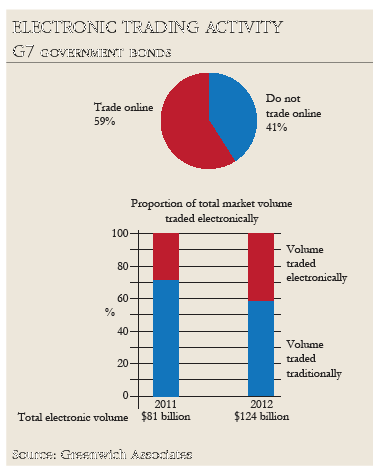Hopes rise for Asia regional bond market
Post on: 9 Апрель, 2015 No Comment

03/05/2012 | Sid Verma
Asian policymakers have thrown their weight behind plans for a regional bond market in Asia
Moves to establish a regional bond market in Asia have picked up pace, amid renewed efforts to deepen financial markets and generate stronger returns from domestic savings, according to Asian policymakers and credit market players gathered at the ADB meetings.
Regional integration enthusiasts are attempting to reverse the bias of Asian investors, who typically invest in their home market or in the US rather than regional markets.
John Stuermer, a member of the Asian bond initiative at the multilateral development bank, said greater harmonization of regional credit standards — including the introduction of a regional credit rating scale — would help “reverse the home bias” of domestic investors in Asia.
The emerging East Asian local currency bond markets expanded 7% to $5.7 trillion in 2011, according to the ADB. However, Asian investors are thought to hold just 15-20% of fixed income securities in the region compared with a roughly 70% domestic bid in Europe.
Asian policymakers have been drumming support for greater regional integration of fixed income markets for the past decade but the pace of cross-border debt purchases has been slow, given the liquidity and perceived diversification benefits of foreign markets as well as home bias, Hung Tran, deputy managing director at the Institute for International Finance (IIF).
On Monday, the government of Indonesia reportedly said it would issue bonds in the renminbi and the South Korean won next year, in a move that would market growing cross-border portfolio investment. ASEAN member states are expected to firm up regional sovereign bond issuance plans during the ADB meeting this week.
Masahiro Kawai, head of the Asian Development Bank Institute, said more harmonized fixed income regulations, co-ordinated financial supervision as well as clearing and settlement programmes would help to boost intra-regional corporate debt financing,
“Many Asian countries has worked hard since early 2000s to develop their sovereign credit markets but more work is needed to boost cross-border integration and harmonize regulatory standards in the corporate sector, in particular,” he told Emerging Markets.
Foreign portfolio flows into Asian local currency bond markets have jumped in recent years given the yields on offer, the region’s rising credit profile and expectations of currency appreciation.
The development of a more integrated fixed income investor base in the region would help create a stable source of financing for Asian borrowers in local currency and reduce the corporate sector’s dependence on banking finance.
One key issue will be whether expectations of Asian sovereign and corporate credit upgrades in the coming years were likely. Michael Petit, head of Standard and Poor’s corporate and government ratings for the Asia-Pacific region, said: “I would caution about extrapolating the trend over the past ten years and assuming the path will develop in the same way.”
Related stories
AFRICA IN THE INTERNATIONAL BOND MARKETS: African .
Africa has been on the cusp of mainstream capital markets for years. While the continent made a breakthrough in the variety of issuance it produced in 2012-13, 2014 looks like it will be the year when African borrowers finally become established
CARIBBEAN DEBT: Lingering debt spectres highlight need for .
Jamaica is getting back on track and could become an unlikely poster child for the IMF. However, elsewhere in the Caribbean the threat of default looms and some countries are not ready to ask for help
ASIAN BANK CAPITAL: Basel spurs bank paper rush across .
Bank debt issuance across Asia is soaring this year, driven by the need to comply with Basel III regulations. Fresh impetus from China is set to send volumes higher still
Kurodas not for turning: resilient BoJ governor shrugs off QE .
In an exclusive interview with Emerging Markets, Bank of Japan governor Haruhiko Kuroda insisted the policies of Abenomics were working, not hurting, and defended the ways the world’s big four central banks were operating monetary policy
LatAm bond party to go on in face of volatility
Rising US interest rates should in theory lead investors to withdraw money from emerging economies so those in Latin America suffering weak growth. But leading debt bankers feel that the party has some time to go.














